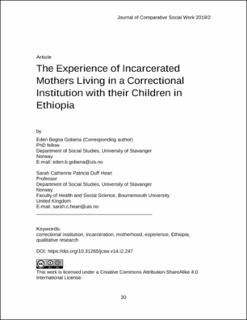| dc.contributor.author | Gobena, Eden Begna | |
| dc.contributor.author | Hean, Sarah | |
| dc.date.accessioned | 2020-03-20T12:11:17Z | |
| dc.date.available | 2020-03-20T12:11:17Z | |
| dc.date.created | 2019-09-30T10:02:41Z | |
| dc.date.issued | 2019-10 | |
| dc.identifier.citation | Gobena, E.B, Hean, S.C.P.D. (2019) The Experience of Incarcerated Mothers Living in a Correctional-Institution with their Children in Ethiopia. Journal of Comparative Social Work, 14(2) | en_US |
| dc.identifier.issn | 0809-9936 | |
| dc.identifier.uri | https://hdl.handle.net/11250/2647851 | |
| dc.description.abstract | The needs of female inmates are different from those of their male counterparts. Little is understood of the nature of these differences, particularly for mothers who in countries such as Ethiopia may be accompanied by their children when in correctional facilities. This article is aimed at exploring these inmates’ experiences of motherhood, the challenges they and their children face and their experiences of the services and support programmes available. The central research question was: ‘What is the experience of incarcerated mothers living in prison with their children in Ethiopia?’ A general qualitative approach was taken in the study, using in-depth interviews (n=10) with incarcerated mothers who had a child living with them in a typical large, high-security Ethiopian correctional institution. Mothers questioned the perceived inclusiveness of the services available to them, with access often being denied owing to their childcare responsibilities. Participation in small business enterprises within the institution was an exception to this. They discussed the challenges facing the mother and child as a family unit, the relationship between the mother, the criminal justice system and society and finally their perceptions of the incarcerated mother as a survivor, resilient in the face of the challenges being experienced. These themes showed that incarcerated mothers perceive themselves as victims of societal discrimination, abuse and structural injustice before and after incarceration, and that correctional institution facilities left them unable to provide adequately for the physical, emotional and educational needs of their children. The role of correctional administrations, policymakers, correctional institution social workers and researchers alike in addressing the inequalities facing mothers in Ethiopian correctional institutions is discussed. | en_US |
| dc.language.iso | eng | en_US |
| dc.publisher | Stavanger: Universitetet i Stavanger | en_US |
| dc.rights | Navngivelse-Ikkekommersiell 4.0 Internasjonal | * |
| dc.rights.uri | http://creativecommons.org/licenses/by-nc/4.0/deed.no | * |
| dc.subject | sosialt arbeid | en_US |
| dc.subject | kvinner i fengsel | en_US |
| dc.title | The Experience of Incarcerated Mothers Living in a Correctional-Institution with their Children in Ethiopia | en_US |
| dc.type | Journal article | en_US |
| dc.type | Peer reviewed | en_US |
| dc.description.version | publishedVersion | en_US |
| dc.subject.nsi | VDP::Social science: 200::Social work: 360 | en_US |
| dc.source.volume | 14 | en_US |
| dc.source.journal | Journal of Comparative Social Work | en_US |
| dc.source.issue | 2 | en_US |
| dc.identifier.doi | 10.31265/jcsw.v14i2.247 | |
| dc.identifier.cristin | 1731055 | |
| cristin.unitcode | 217,7,3,0 | |
| cristin.unitname | Institutt for sosialfag | |
| cristin.ispublished | false | |
| cristin.fulltext | postprint | |
| cristin.qualitycode | 1 | |

